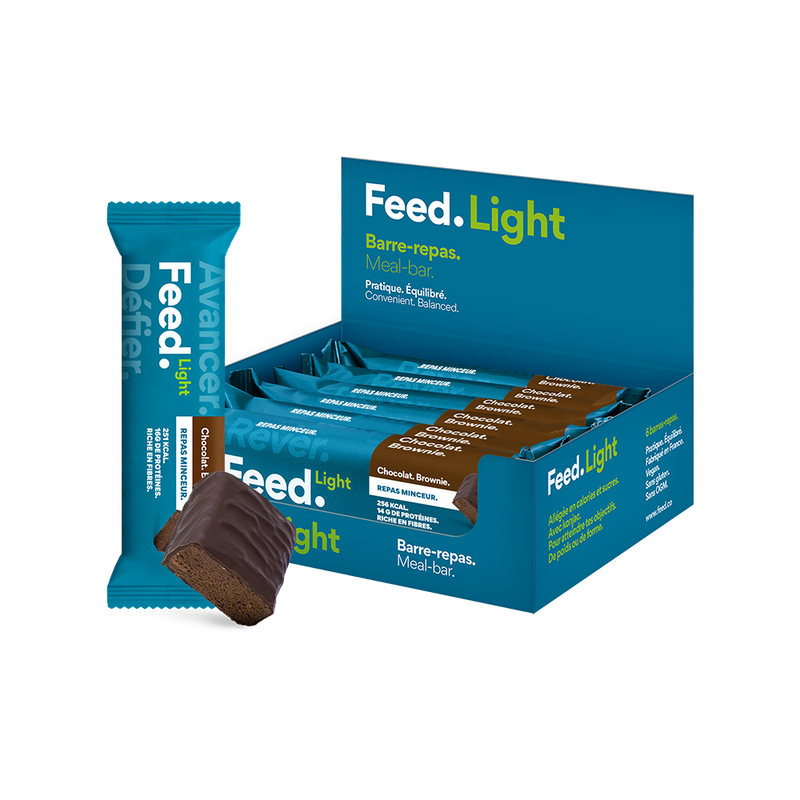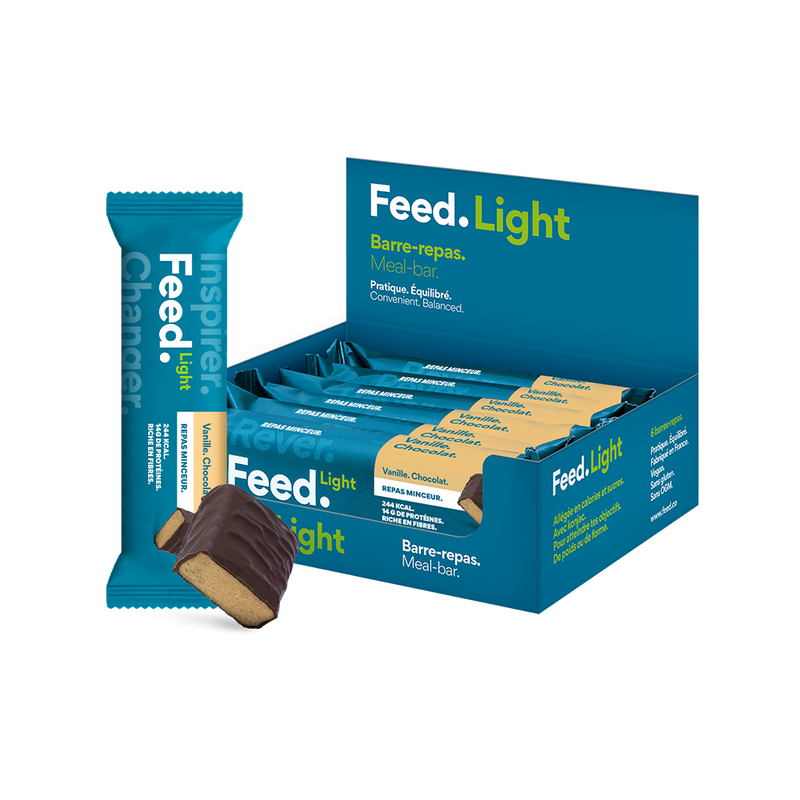It's normal to feel the urge to eat or snack between meals from time to time, but for some it can be difficult to manage and cause weight or health problems.
Particularly during a slimming diet, it is even more important to control your food consumption. Fortunately, there are effective tips to combat snacking, help you lose weight or feel better about your body, whether you are on a weight loss diet or not. Here are our appetite suppressant tips!
How to curb hunger: Eat enough protein
Protein has a satiating effect on the body. Foods rich in protein such as meats, fish, eggs, legumes and nuts are particularly effective in suppressing the appetite and fighting cravings between meals.
It is recommended to consume at least 0.8 grams of protein per kilogram of body weight per day to maintain optimal health.
Discover our protein snacks to supplement your protein intake and satisfy your little hunger pangs healthily.
How to curb hunger: Eat enough fiber
Dietary fiber increases the feeling of satiety. Soluble fiber, such as that in fruits and vegetables and whole grains, can absorb water and form a thick substance in the stomach that can help slow digestion and prolong satiety. Insoluble fiber can help stimulate bowel contractions, which can also contribute to feelings of fullness. It is important to consume enough dietary fiber to maintain good intestinal transit and overall good health.
How to curb hunger: Eat the right carbs
Complex carbohydrates, such as whole grains, wholemeal bread, vegetables and fruits, can help control hunger by providing a slow-release source of energy and stimulating the release of hormones sent to the brain to stop hunger. hunger.
How to curb hunger: Drink plenty of water
When you drink water, it fills the stomach and can make you feel fuller, leading you to eat less. Additionally, it is important to maintain proper hydration for overall good health. It is recommended to drink approximately 8 glasses of water per day for a healthy adult. It should also be noted that drinking before meals can help reduce the amount of food consumed during the meal.
How to stop hunger: Eat solids
Solid foods provide important nutrients and help you feel full longer.
Solid foods are generally more filling than liquid foods, which can help prevent cravings between meals. For example, eating an apple may make you feel fuller than drinking apple juice.
How to stop hunger: Eat slowly
The digestion process begins in the mouth, where enzymes begin to break down the food. Taking the time to chew aids digestion and can help reduce the amount of food consumed during a meal. By taking the time to savor each bite, you are also more aware of what you are eating and how full you feel. This can help you avoid eating more than you need. Each meal should last at least 20 minutes.
How to stop hunger: Avoid sugar
Avoiding sugar can be an effective way to reduce appetite. Foods that are too sweet can cause blood sugar levels to spike, followed by rapid drops, which can lead to frequent and increased hunger. Additionally, sugary foods are often made up of empty calories, which can lead to weight gain and hunger between meals.
It is important to replace overly sugary foods with healthier and more nutritious options, such as fruits, vegetables. This can help you feel full longer.
How to stop hunger: Exercise
Exercising can help curb hunger and promote weight loss. Exercise stimulates the production of certain hormones like leptin and norepinephrine, which can help regulate hunger through their transmission of information to the brain. Exercise can also increase metabolism, which can help burn calories. Additionally, exercise can help reduce stress, which can often cause food cravings. It is important to note that it is important not to compensate for the calories burned by eating more, which is why it is best to consult a nutrition professional or a doctor to establish a suitable and balanced eating plan.
It is recommended to engage in at least 150 minutes of moderate-intensity physical activity or 75 minutes of vigorous-intensity physical activity per week for a healthy adult.
How to stop hunger: Get enough sleep
Getting enough sleep is another way to regulate your appetite. A lack of sleep can negatively impact hormones. Sleep deprivation can increase the production of ghrelin, the hormone that signals hunger to the brain, and reduce the production of leptin, the hormone that signals satiety.
It is recommended to sleep between 7 and 9 hours per night for a healthy adult. By getting enough sleep, you can control hunger and make healthier food choices, which can help lose weight and maintain good overall health. It is therefore important to take the time to get enough sleep each night to effectively suppress hunger.
How to stop hunger: using appetite suppressants
An appetite suppressant is a substance or food used to reduce feelings of hunger and help control food intake. These may be food supplements, drinks or medications. They are widely used during slimming diets with the aim of losing weight.
However, it is important to note that most appetite suppressants can have negative side effects, such as trouble sleeping, anxiety, headaches, and heart problems. Additionally, some appetite suppressants can cause dependence and tolerance, which may lead to increased food intake after the effect of the appetite suppressant wears off.
It is therefore important to seek advice from a doctor or nutrition specialist before taking an appetite suppressant, especially if you have health problems or are already taking other medications. In general, it is better to control hunger by eating a balanced diet and engaging in regular physical activity, rather than relying on an appetite suppressant to lose weight.
List of natural appetite suppressant foods
There are many natural appetite suppressants that can help reduce feelings of hunger and stop snacking. They have a low glycemic index, thus avoiding blood sugar peaks and cravings. Here are some of the most common appetite suppressants:
- Lawyers
- Legumes (beans, lentils, peas)
- Whole grains (whole grain bread, brown rice, quinoa, oatmeal)
- Nuts and seeds (almonds, flax seeds, chia seeds, cashews, walnuts)
- Fruits (apples, bananas, strawberries, melons)
- Vegetables and greens (carrots, zucchini, broccoli, spinach, cauliflower)
- Low-fat dairy products (milk, yogurt, cheese)
- Lean meats (chicken, turkey, extra-lean beef)
- Oily fish (salmon, tuna, mackerel)
- Herbal drinks such as green tea
It is important to note that these appetite suppressants should not be used as a substitute for a balanced and healthy diet. Natural appetite suppressants can be an effective option for reducing hunger without the potential side effects of artificial appetite suppressants. Ask a doctor for advice to evaluate the options and recipes best suited to your needs.
Discover our balanced and lightslimming meals , with konjac to keep you satisfied until the next meal.
In summary.
Stopping the urge to eat can be a challenge, but there are tips to help you feel fuller throughout the day. Having a healthy and balanced diet, eating appetite suppressant foods rich in fiber, drinking water, and practicing regular physical activity are tips to avoid the urge to snack and stay full for as long as possible. A diet tailored to your needs is important to control your appetite.






















